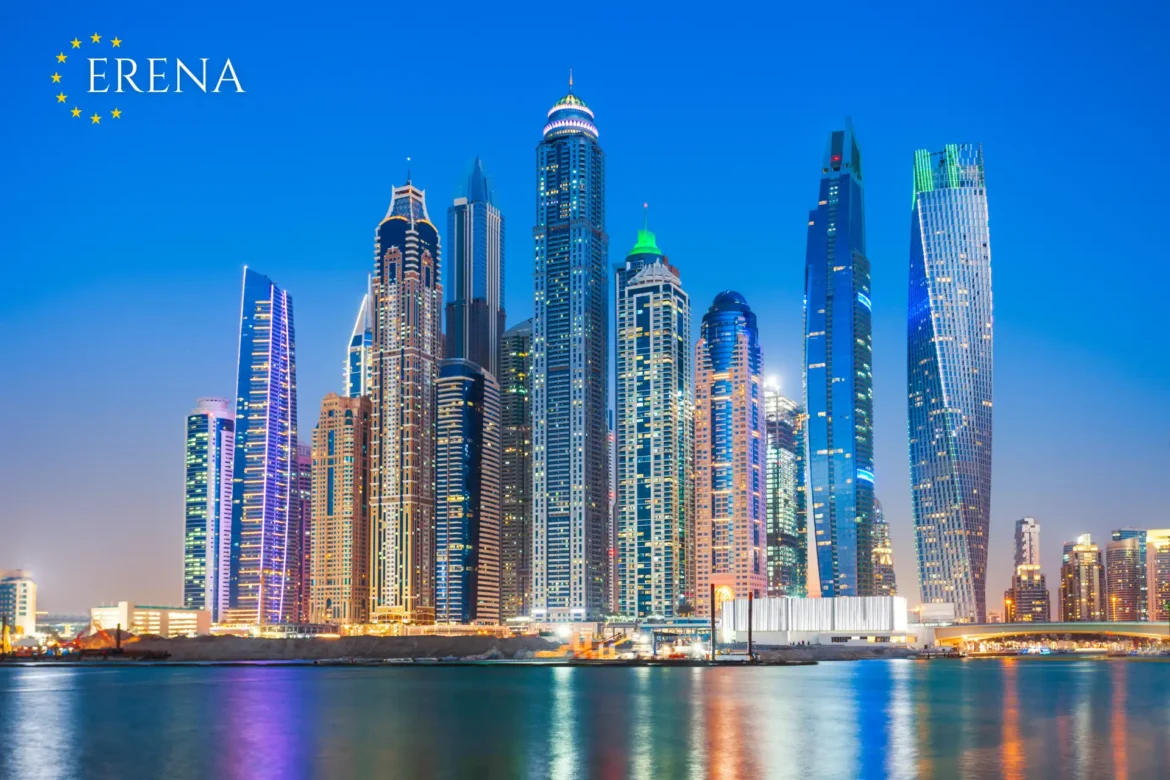Dubai, one of the brightest examples of urban and economic miracles of the 21st century, continues to amaze the world with its unique approaches to real estate and infrastructure development. European markets, despite their rich history and developed infrastructure, face new challenges such as urbanization, housing shortages, environmental issues, and the need to adapt to modern technologies. In this article, we will explore what European real estate markets can learn from Dubai by analyzing key aspects such as urban planning, innovative construction technologies, investment attractiveness, and environmental sustainability.
Unique Urban Planning: From Sand to Metropolis
Planning from Scratch: The Dubai Model
Unlike most European cities, Dubai started its development almost from scratch. In the 1960s, the city’s population was only 40,000 people, with an economy based mainly on oil extraction. Today, Dubai is a metropolis with a population exceeding 3.5 million, whose economy is based on tourism, real estate, and innovations.
What European Cities Can Adopt:
- Strategic Planning. Dubai was developed based on well-defined master plans, including designated areas for residential, commercial, and tourist properties. For example, the Dubai Marina district was designed as a hub for luxury housing and entertainment, attracting millions of tourists and investors.
- Integration of Multi-Functionality. Areas like Downtown Dubai combine residential complexes, offices, shopping centers (e.g., Dubai Mall), and leisure zones, making them attractive for both residents and businesses.
Flexible Zoning
Dubai demonstrates a high level of zoning flexibility, allowing districts to adapt to current market needs. For example, Jumeirah, initially a residential area, has also become a hub for the hotel business due to growing tourist demand.
European Perspective: Many European cities suffer from rigid zoning regulations that make it difficult to adapt to economic changes. Dubai teaches that flexibility can be the key to sustainable development.
Innovative Construction Technologies
Reaching New Heights: The Symbolism of Skyscrapers
Dubai is famous for its skyscrapers, including the Burj Khalifa, the world’s tallest building (828 meters). However, these structures are not just prestige symbols but engineering masterpieces utilizing advanced technologies.
- 3D Printing in Construction. In 2016, Dubai introduced the world’s first office building printed using 3D technology. This method reduces construction costs by 70% and shortens project implementation times.
- Smart Buildings. Most new projects in Dubai are equipped with smart management systems for energy and resources, making them more eco-friendly and cost-effective.
Sustainable Materials
Dubai actively incorporates materials that reduce the carbon footprint. For example, glass facades with nano-coatings help reduce heat absorption and lower air conditioning costs.
European Perspective: European markets could adopt 3D printing technology for mass affordable housing construction and implement intelligent building management systems to improve energy efficiency.
Investment Attractiveness
Transparency and Accessibility
Dubai has created one of the world’s most investment-friendly environments through minimal taxation and transparent conditions for foreign investors. In 2002, the Freehold system was introduced, allowing foreigners to own property in designated areas.
- In 2023, real estate investments in Dubai exceeded $143 billion, setting a record.
- More than 30% of property buyers are foreign investors, including Europeans, demonstrating trust in the market.
Simplified Processes
Dubai actively digitizes real estate transactions. The Dubai REST platform allows online transactions, eliminating bureaucracy.
European Perspective: European countries, where property purchasing processes can be complex and time-consuming, could implement similar digital platforms to increase market attractiveness.
Environmental Sustainability
Green Technologies
Dubai invests in projects aimed at reducing environmental impact. Some key initiatives include:
- The Mohammed bin Rashid Al Maktoum Solar Park, the world’s largest solar park, which will provide 75% of Dubai’s energy consumption by 2050.
- Green Buildings. In 2014, Dubai introduced the Green Building Regulations, requiring all new buildings to meet environmental standards.
Water and Energy Conservation
With limited water resources, Dubai implements innovations such as water recycling systems and drip irrigation.
European Perspective: Despite abundant natural resources, Europe faces environmental challenges. Adopting Dubai’s experience in renewable energy and sustainable construction could be a crucial step toward climate goals.
Social Aspects and Quality of Life
Appeal for Expats
Dubai attracts millions of expatriates thanks to its high quality of life, low crime rates, and numerous career opportunities. In 2022, Dubai housed over 200 nationalities, making it one of the most multicultural cities in the world.
World-Class Infrastructure
Modern airports, transportation systems, schools, and healthcare facilities make Dubai attractive for both residents and tourists.
European Perspective: Many European cities could improve their infrastructure to enhance comfort for residents and expats, attracting more foreign professionals.
Conclusion
Dubai serves as an example of how bold vision, innovation, and flexibility can transform a city into a global hub for investment and technology. European real estate markets, facing the need to adapt to new realities, can learn valuable lessons from Dubai.
- Clear planning and multi-functionality can make cities more attractive for residents and businesses.
- Implementing advanced technologies, such as 3D printing and smart buildings, can accelerate construction and reduce costs.
- Increasing investment transparency and simplifying processes can make the European real estate market more competitive.
- Using green technologies and sustainable solutions will be a key step toward an ecological future.
Ultimately, a combination of Dubai’s best practices and the unique features of European markets can usher in a new era in real estate development and urban planning.
Subscribe to us on Twitter, Facebook, and Telegram to receive exclusive materials, stay up to date with the latest news, and take part in community discussions.

